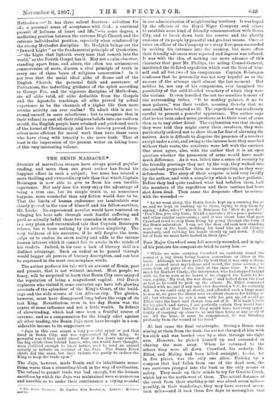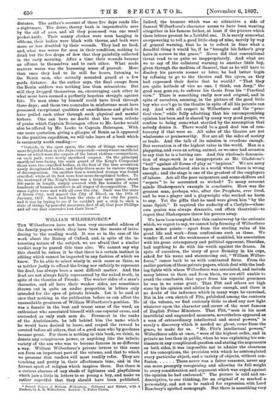THE BENIN MASSACRE.* STORIES of marvellous escapes have always proved
popular reading, and more than one great author has found his happiest effort in such a subject ; but none has related a more thrilling and extraordinary tale than that which Captain Boisragon is now able to give us from his own terrible experience. Not only does his story enjoy the advantage of being a true one, but its simple truth is, as sometimes happens, more wonderful than any fiction would dare to be. That the limits of human endurance are incalculable was clearly proved in the case of himself and his fellow-survivor, Mr. Locke. No experienced novelist would have ventured on bringing his hero safe through such fearful suffering and
peril an actually befell these two comrades in misfortune. It is a very plain and unvarnished tale that Captain Boisragon relates, but it loses nothing by its artless simplicity. The
very baldness of his narrative, if he will forgive the term, Aelps us to realise its stern reality and adds to the intense human interest which it cannot fail to awake in the minds of his readers. Indeed, in his case a lack of literary skill is a distinct advantage. Such an ordeal as he passed through would beggar all powers of literary description, and can best be expressed in the most commonplace words.
The author prefaces his tale with an account of Benin, past and present, that is not without interest. Most people, we fancy, will be surprised to learn that Benin City once enjoyed the reputation of being a magnificent capital. Old Dutch explorers who visited it some centuries ago have left glowing accounts of the splendour of the King's Court, of the build- ings and the wide streets of this African city. The glories, however, must have disappeared long before the reign of its last King. Nevertheless, even in his day Benin was the centre of some influence and not a little wealth. In default of slave-trading, which had once been a fruitful source of revenue, and as a compensation for the kingly edict against all other trading, the Benin Juju must have brought in a con- siderable income to its supporters :—
" Juju in this case meant a very powerful spirit or god that lived in Benin City, and was represented by the King. So powerful was it that until about four or five years ago some of the big chiefs close behind Lagos, who, one would have thought, were civilised enough to know better, used to send an annual subsidy or tribute on account of the Juju. The Benin River chiefs did the same, but their tribute was partly to induce the King to keep the trade open."
The Juju, however, made Benin and its inhabitants some- thing worse than a stumbling-block in the way of civilisation. The refusal to permit trade was bad enough, but the human sacrifices by which the Juju was maintained were so numerous and horrible as to make their continuance a crying scandal
• The Benin Massacre. By Captain Alan BoisrarAs. London: Methuen and Co.
in our administration of neighbouring territory. It was hoped by the officials of the Royal Niger Company and others to establish some kind of friendly communication with Benin City, and to break down both the reserve and the ghastly
customs of its people by peaceful and gradual means. Once or twice an officer of the Company or a stray European succeeded in making his entrance into the country, but more often their friendly advances were rejected and ingress was refused.
It was with the idea of making one more advance of this character that poor Mr. Phillips, the acting Consul-General, instituted the ill-fated expedition which cost the lives of him- self and all but two of his companions. Captain Boisragon confesses that he personally was not very hopeful as to the success of the attempt until almost the last moment. But neither he, nor any of his companions, ever imagined the possibility of the cold-blooded treachery of which they were the victims. It even horrified the not too sensitive honour of the surrounding tribes. "It be monkey palaver, it no be man palaver," was their verdict, meaning thereby that no men could have behaved so ill. The expedition was studiously careful to present a peaceful appearance. The author says that he has been asked more questions as to their want of arms than as to any other detail. The explanation was that though they were told they might carry their revolvers, they were particularly ordered not to show them for fear of alarming the natives. As it is difficult to disguise the presence of a revolver except under a coat, and owing to the intense heat they marched without their coats, the revolvers were left with the carriers. One must agree, also, with the author that it is an open question whether the possession of arms would have made much difference. As it was, lulled into a sense of security by the friendly greetings they met by the way, they walked into the ambush prepared for them as unsuspecting as they were defenceless. The story of their surprise is told very lucidly by the author, and with a simplicity which is rather pathetic. Before they had quite realised what had befallen them, half the members of the expedition and their carriers had been shot down dead. Then came the desperate effort to retreat with the wounded :—
"As we went along, the Benin fiends kept up a running fire at us, and we kept on rushing up to them, trying to stop them by saying, Adoo, adoo ? ' which is Beninese for 'How do you do ? ' 'Don't fire, you silly fools; it's all a mistake ; it's a peace palaver; and other similar expressions ; and it was about here that poor Crawford tried to stop them firing by going through the form of the Benin salutation. I can see the dear old man now standing some way in the bush, nodding his head like an old Chinese mandarin, and rubbing his hands slowly up and down. A silly lot of fools we must have looked in their eyes."
Poor Major Crawford soon fell severely wounded, and in spite of his protests his companions tried to carry him :—
"While we were carrying Crawford we suddenly heard tho sound of a big drum being beaten somewhere or other in the bush. Although we knew perfectly well that it was only a drum. yet it seemed most mysterious and weird, tho noise seeming to come from all parts of the bush at the same time. It was too much for Herbert Clarke, the interpreter, who had stopped behind with us, for as soon as he heard it he clapped his hands to his ears, saying, • My God, the war drum !' and bolted down the road as fast as he could to pick up the others. Dr. Elliot remained behind with us, and if any man ever deserved a V.C. he certainly did. As we could only go slowly, and afforded such a large mass to aim at, we gave the Benin men excellent chances for killing us all ; but whenever he saw a man with his gun up, off would go Elliot into the bush and charge him out of it. If it hadn't been for his pluck and nerve, I am perfectly certain they would have killed us all at that time, for they would have had every oppor- tunity of creeping up close to us and then firing at any or all of us. All the time, it must be remembered, he was bleeding profusely from the wound in his head."
At last came the final catastrophe. Seeing a Benin man aiming at them from the bush, the author charged at him with
his stick and was bowled over by a shot through the right arm. However, he picked himself up and succeeded in chasing the man away. When he returned to the others they were all down. Crawford, his orderly, Dr.
Elliot, and Mating had been killed outright ; Locke, hit in five places, was the only one alive. Picking up a compass that had fallen from one of the dead men, the two survivors plunged into the bush as the only means of safety. They made up their minds to try for Gwatto Creek, which lay to the north-west of them. The actual distance of the creek from their starting-point was about seven miles—
possibly, in their wanderings, they may have covered seven- teen miles—and it took them five days to accomplish that distance. The author's account of those five days reads like a nightmare. The dense, thorny bash is impenetrable save by the aid of axes, and all they possessed was one small pocket-knife. Their scanty clothes were soon hanging in ribbons, their bodies were black with thorns, and both were more or less disabled by their wounds. They had no food, and, what was worse for men in their condition, nothing to drink but the few drops of dew that they painfully collected in the early morning. After a time their wounds became an offence to themselves and to each other. What made matters worse was the harassing sense of pursuit. More than once they had to lie still for hours, listening to the Benin men, who actually mounted guard at a few yards distance. As the author says, the final escape from the Benin soldiers was nothing leas than miraculous. But still they dragged themselves on, encouraging each other in what must have seemed a perfectly hopeless struggle against fate. No man alone by himself could have lived through those days; and these two comrades in misfortune must have possessed exceptional qualities of unselfishness and pluck to have pulled each other through such physical and mental torture. One can have no doubt that the warm tribute of praise which Captain Boisragon offers to Mr. Locke would also be offered by Mr. Locke to Captain Boisragon. With one more quotation, giving a glimpse of Benin as it appeared to the punitive expedition, we will take leave of a book which is eminently worth reading :—
" Outside, in the open space, the state of things was almost more frightful than in the Juju compounds—everywhere sacrificial trees on which were the corpses of the latest victims—everywhere, on each path, were newly sacrificed corpses. On the principal
sacrificial tree facing the main guard of the King's Compound there were two crucified bodies, at the foot of the tree seventeen newly decapitated bodies, and forty-three more in various stages of decomposition. On another tree a wretched woman was found crucified, while at its foot were four more decapitated bodies. To the westward of the King's house was a large open space, about 300 yards in length, simply covered with the remains of some hundreds of human sacrifices in all stages of decomposition. The same sights were met with all over the city. Such was the state of Benin City, well named the City of Blood, on the 18th of January, 1897. Such had been the state of the city for years, and it was by trying to see if he couldn't put a stop to such a state of things by peaceful measures, first of all, that poor Phillips and all our dear comrades lost their lives."























































 Previous page
Previous page